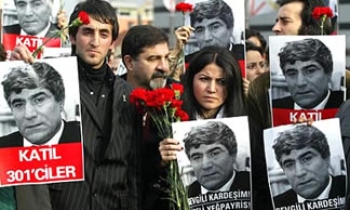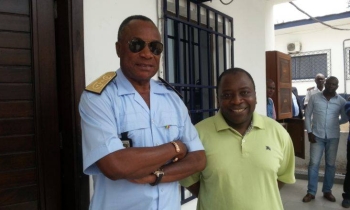NEW YORK: As the crisis over the Danish cartoons of the Prophet Muhammad flared over the last two weeks, leaders of several American Muslim groups began working quietly to try to mediate between European Muslims and the West.
The leaders - representing three national organizations and two mosques - say they share the outrage over the cartoons felt by Muslims in countries where riots have turned bloody and some Danish embassies have been burned.
Yet in telephone calls to Muslim leaders in Europe and in interviews with media outlets in the Middle East like Al Jazeera, they have offered a consistent message to Muslims: You must stop the violence because the Prophet Muhammad would never have approved, and you are playing into the stereotype of Muslims as barbarians.
At the same time, in meetings at the Washington embassies of European nations, the American Muslim leaders have presented their concerns to foreign diplomats: We, too, value free speech, but your governments should condemn the cartoons as hateful and bigoted and work at better integrating your alienated Muslim minorities.
"The reason that Muslims in America have not responded the way they have in Europe is that we have come to know that so many people here speak out against such bigotries, and so many newspapers have not published the cartoons," said Mohamed Magid, the imam and executive director of a large mosque in Virginia, the All Dulles Area Muslim Society, who was among a group of Muslim leaders who met with the ambassador of Denmark, Friis Arne Petersen, last week in Washington.
The American Muslim leaders are holding up their approach to living in a Western nation as a model. They told the Danish ambassador that they have lived in the United States longer than Muslims have lived in most European countries, and despite obstacles have managed to build effective organizations and achieve greater integration, acceptance and economic success than their brethren in Europe have.
They portray the cartoons as part of a wave of global Islamophobia, and have encouraged Muslim groups in Europe to use the same term.
"We told the ambassador flat out that the biggest resource you have is the American Muslim community," said Ahmed Younis, national director of the Muslim Public Affairs Council. "We, too, deal with Islamophobia and discrimination, but we have developed lines of communication for trying to resolve these problems."
The American Muslims are encouraging European Muslims to build better alliances with leaders of other faiths. In the United States, Muslims across the country intensified their involvement in interfaith organizations after the Sept. 11 terrorist attacks, an effort they say has helped defuse tension.
Asked why Europe's Muslims would listen to America's, Abdul Karim Bangura, a professor of international relations and Islamic studies at American University in Washington, said, "Muslims in America and in Canada are doing very well economically and in other ways, and that gives them pretty significant clout to get Muslims in Europe to listen to what they have to say."
How the American Muslims' efforts will play out in Europe remains unclear. Muslim leaders in Europe insist that they have already been playing a pivotal role in appealing for calm and persuading some Muslims to vent their anger through peaceful means.
Abdul Wahid Pedersen, an influential imam in Denmark, said in an interview Friday that Denmark's 250,000 Muslims could learn from their American counterparts by becoming more united.
"In the past, the community here has been divided and this had made it difficult to speak with one voice," he said.
Nihad Awad, national executive director of the Council on American-Islamic Relations in Washington, said American Muslim leaders had been invited by Danish Muslim groups to meet in Denmark and help ease relations with the Danish government.
Awad said the Danish Muslims were looking to the American Muslims for advice because when anti-Muslim statements were made in the past by American religious leaders or talk show hosts, the American Muslim groups had persuaded the Bush administration to issue denunciations. "News of those offensive remarks had traveled around the world, but people were satisfied with how we handled it," Awad said.
Karen Hughes, the under secretary of state for public diplomacy, said, "The voices of Muslim Americans have more credibility in the Muslim world, frankly, than my voice as a government official, because they can speak the language of their faith and can share their experience of practicing their faith freely in the West, and they can help explain why the cartoons are so offensive."
Muslim American leaders say they feel anguish over the Muslim world's violent protests, which have left at least 11 dead. Azeem Khan, assistant secretary general of the Islamic Circle of North America, based in New York, said, "It hurts us when people attack embassies, because it reinforces the image that we were protesting in the first place, which is that Muslims are violent."
In his sermon during Friday prayer, Imam Magid in Virginia said he told worshippers that during the Prophet Muhammad's life, a woman threw trash in his house, and other people had called him crazy and spit in his face.
"He responded by forgiving her and asking God to guide those who had wronged him," Magid said.
Dan Bilefsky of the International Herald Tribune contributed reporting from Paris for this article.









